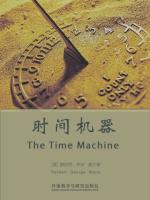Time Machine
之之
The "Time Machine," a novella by H.G. Wells, is an iconic
piece of science fiction literature that continues to captivate readers
with its exploration of time travel and the unknown future. Published in
1895, this groundbreaking work not only presented a thrilling adventure
story but also offered profound social commentary on the Victorian era
and the potential fate of humanity. H.G. Wells, a writer known for his
imaginative tales and prophetic visions, masterfully weaves together
elements of science, philosophy, and adventure to create a narrative
that transcends mere entertainment. The protagonist, an unnamed inventor
often referred to as the Time Traveler, constructs a machine capable of
propelling him through time. This device, resembling a large chair with
intricate dials and levers, becomes the gateway to a world far beyond
his own. As the Time Traveler embarks on his journey, he finds himself
hurtling thousands of years into the future, where he encounters a
divided human race. The Eloi, a seemingly peaceful and simple community,
inhabit the beautiful yet desolate landscape, while the Morlocks,
hideous and savage creatures, lurk underground. This stark contrast
between the two societies serves as a powerful allegory for the class
divisions and social inequalities that Wells saw in his own society.
Wells employs vivid descriptions and detailed settings to immerse the
reader in both the familiar past and the alien future. His use of
scientific theory, although speculative, lends credibility to the
fantastical concept of time travel. Moreover, Wells uses the narrative
to challenge his readers' assumptions about progress and the
inevitability of societal evolution. One of the novella's most enduring
themes is the idea of determinism versus free will. As the Time Traveler
grapples with the consequences of his actions and the potential impact
on the future, readers are left to ponder whether our choices shape our
destiny or if the course




 京公网安备 11010802032529号
京公网安备 11010802032529号